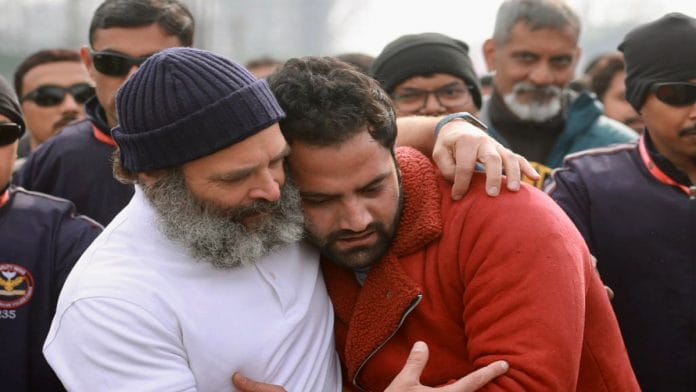Srinagar: As the Congress’ Bharat Jodo Yatra comes to an end, Rahul Gandhi, who led the yatra said, that India’s opposition parties weren’t scattered, although he admitted that they had their differences.
Addressing his last press conference at the yatra, Gandhi once again termed the fight against the BJP an “ideological” one and said it would have an impact on national politics.
“Opposition unity comes after conversations and a shared vision. To say that the opposition is scattered is not correct. Sure, there are differences in the opposition but they talk to each other. The opposition will stand together and fight together. This is an ideological fight. On one side there’s the RSS-BJP and, on the other, it’s the forces opposed to them”, said Gandhi, in response to a question.
Gandhi, who held 13 media interactions since the pan-India march began in September, said that it has been one of the most beautiful experiences of his life.
“I’ve learnt a lot, met lakhs of people, spoke to them. I don’t have words to describe it. The goal of the yatra was to unite India. It was against hate and violence…This has been the deepest and most beautiful experience of my life,” he said.
The Bharat Jodo Yatra, which began in Kanyakumari on 7 September, will officially end in Srinagar with a public rally Monday. In the last five months, the yatra covered nearly 4,000 km, across 13 states and two union territories.
Also Read: Bharat Jodo Yatra has transformed Rahul’s image. But no guarantee of electoral victory
Restoration of statehood in J&K, impact of the yatra
Gandhi also spoke about the impact the yatra will have on national and Kashmir politics.
“This yatra has given an alternative vision. The BJP-RSS has given a vision of hatred and arrogance. Our vision is that of ‘nafrat ke baazaar mein pyaar ki dukaan’. India has two routes. One is of suppressing other people. The other is of uniting people. This yatra will have an effect on Indian politics and it is just the start”, he said, adding that the Congress will think of further actions to put forward its alternative vision.
Gandhi also spoke for the restoration of statehood for Jammu and Kashmir.
“Statehood and restoration of the democratic process in J&K are fundamental and very important. That is the first step. The steps that will come after that, I don’t want to comment on it. All states in the country have an elected government and the same should happen for J&K. An appropriate solution should also be found for Ladakh”, he said.
He, however, refused to speak on the party’s position on Article 370 stating that his position is the same as that of the party’s working committee resolution.
The party has compared Gandhi’s flag hoisting at Srinagar’s iconic Lal Chowk Sunday to former prime minister Jawaharlal Nehru’s in 1948. At the time, India’s first prime minister had reiterated his promise of a plebiscite for the people of J&K to determine whether they would continue in the Indian Union.
At the media interaction, Gandhi was asked if he’d live up to his great-grandfather’s promise. But the Congress leader side-stepped the question by saying he would not want to comment on the historical aspect of things.
“I’m not happy with what I see in J&K. I have sadness when I walk through J&K. When I first entered Jammu, a strange idea came to my mind. My ancestors started from Kashmir and came to Allahabad. And I’m making the reverse journey. I felt like I was coming home”, he said. “I have come here with open arms to provide whatever help I can.”
Gandhi said a prospective east-to-west yatra on the lines of the Bharat Jodo was still under consideration.
“This is just the first step. I have deeper plans. But let’s see,” he said.
(Edited by Uttara Ramaswamy)
Also Read: Functionality or political message? Rahul’s beard in Bharat Jodo Yatra a matter of debate






